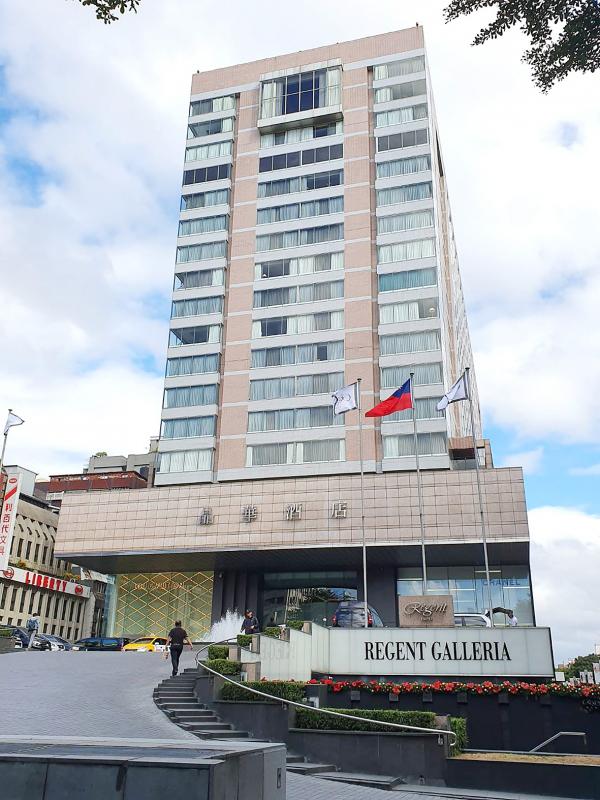Formosa International Hotels Corp (FIH, 晶華國際酒店集團) yesterday said that its board of directors would not collect a bonus from last year’s earnings and senior executives would take a temporary pay cut of 30 percent to help the company ride out the COVID-19 pandemic.
The decision was made after the board approved last year’s earnings results. The nation’s top hotel and restaurant operator posted NT$1.38 billion (US$45.39 million) in net profit, or earnings per share of NT$10.58.
That represents a 2 percent decline from a year earlier, as the group can no longer recognize income from properties overseas after selling its majority stakes to InterContinental Hotels Group PLC.

Photo: CNA
“I’m grateful to the board directors and senior executives for their understanding and sacrifices,” FIH chairman Steven Pan (潘思亮) said.
“The group is to take advantage of the slow season to upgrade its products and services so that it can remain competitive during this tough time,” he said.
FIH’s move came after top retail and online travel brand Lion Travel Service Co (雄獅旅行社) last week introduced similar measures, which Pan praised as “admirable.”
The board also called on the government to focus on the plight facing the tourism and hospitality industry due to the pandemic.
Major hotel chains in Taiwan have seen their business plunge by 30 to 50 percent from a year earlier as foreign tourist arrivals have come to a virtual standstill, while domestic travelers favor staying home to avoid being exposed to the virus.
FIH said that it would distribute a cash dividend of NT$3.92 per share based on earnings from the second half of last year, as it has sufficient liquidity in the medium term.
The company had already distributed a cash dividend of NT$6.12 per share based on earnings made in the first half of last year.
Despite its generous payout scheme, FIH shares tumbled 5.2 percent to close at NT$94.8 yesterday, Taiwan Stock Exchange data showed.
They have dropped 43.57 percent so far this year, more than the broader market’s decline of 25.9 percent.
The group, which owns the Regent Taipei, Silks Place (晶英) and Just Sleep (捷絲旅) hotel brands, as well as independent restaurants, is seeking to shore up business through major discount offers, as its peers are doing. Many are also launching takeout food services to drive up food and beverage sales.

In Italy’s storied gold-making hubs, jewelers are reworking their designs to trim gold content as they race to blunt the effect of record prices and appeal to shoppers watching their budgets. Gold prices hit a record high on Thursday, surging near US$5,600 an ounce, more than double a year ago as geopolitical concerns and jitters over trade pushed investors toward the safe-haven asset. The rally is putting undue pressure on small artisans as they face mounting demands from customers, including international brands, to produce cheaper items, from signature pieces to wedding rings, according to interviews with four independent jewelers in Italy’s main

Japanese Prime Minister Sanae Takaichi has talked up the benefits of a weaker yen in a campaign speech, adopting a tone at odds with her finance ministry, which has refused to rule out any options to counter excessive foreign exchange volatility. Takaichi later softened her stance, saying she did not have a preference for the yen’s direction. “People say the weak yen is bad right now, but for export industries, it’s a major opportunity,” Takaichi said on Saturday at a rally for Liberal Democratic Party candidate Daishiro Yamagiwa in Kanagawa Prefecture ahead of a snap election on Sunday. “Whether it’s selling food or

CONCERNS: Tech companies investing in AI businesses that purchase their products have raised questions among investors that they are artificially propping up demand Nvidia Corp chief executive officer Jensen Huang (黃仁勳) on Saturday said that the company would be participating in OpenAI’s latest funding round, describing it as potentially “the largest investment we’ve ever made.” “We will invest a great deal of money,” Huang told reporters while visiting Taipei. “I believe in OpenAI. The work that they do is incredible. They’re one of the most consequential companies of our time.” Huang did not say exactly how much Nvidia might contribute, but described the investment as “huge.” “Let Sam announce how much he’s going to raise — it’s for him to decide,” Huang said, referring to OpenAI

The global server market is expected to grow 12.8 percent annually this year, with artificial intelligence (AI) servers projected to account for 16.5 percent, driven by continued investment in AI infrastructure by major cloud service providers (CSPs), market researcher TrendForce Corp (集邦科技) said yesterday. Global AI server shipments this year are expected to increase 28 percent year-on-year to more than 2.7 million units, driven by sustained demand from CSPs and government sovereign cloud projects, TrendForce analyst Frank Kung (龔明德) told the Taipei Times. Demand for GPU-based AI servers, including Nvidia Corp’s GB and Vera Rubin rack systems, is expected to remain high,